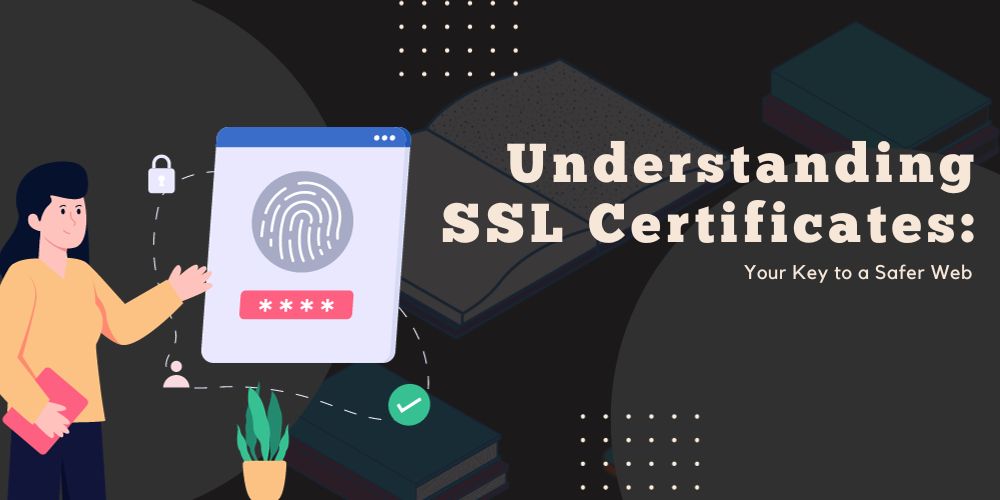In a world where online transactions and data sharing are commonplace, ensuring the security of your website is priority number one.
One critical component is the SSL certificate.
In this article, we’ll dive into what SSL certificates are, their significance, and what happens when a website doesn’t have one.
So, let’s take a deeper look at SSL Certificates.
What is an SSL Certificate?
An SSL certificate, or Secure Sockets Layer certificate, is a digital credential that serves as the guardian of your website’s security.
Think of it as a virtual bodyguard that authenticates your website’s identity and creates a secure, encrypted connection between the web server and the user’s browser.
When you see that reassuring padlock icon next to a URL in your browser’s address bar, that’s the SSL certificate in action, safeguarding your online interactions.

How Do SSL Certificates Work?
SSL certificates operate by employing encryption algorithms to scramble data when someone goes to your website, making it unreadable to potential hackers. The process unfolds in the blink of an eye:
- A browser or server initiates a connection with a secured website, prompting the web server to verify its identity.
- The web server responds by sending a copy of its SSL certificate to the browser or server.
- The browser or server checks the SSL certificate’s trustworthiness. If it’s legitimate, this is communicated to the web server.
- The web server reciprocates with a digitally signed acknowledgment, kickstarting an SSL encrypted session.
- Encrypted data flows between the browser or server and the web server.
Essentially, it’s like an “SSL handshake.” And it all happens in an instant.
When an SSL certificate is in place, the URL is prefixed with HTTPS (HyperText Transfer Protocol Secure), signifying enhanced security. Without an SSL certificate, you’ll see only HTTP, lacking the crucial ‘S’ for secure. The presence of a padlock icon in the address bar provides peace of mind to users, conveying trustworthiness.
To explore the specifics of an SSL certificate, simply click on the padlock symbol in your browser. Here, you’ll find details like the domain name it was issued for, the issuing authority, and the certificate’s expiry date, among other information.
Why Do You Need an SSL Certificate?
The importance of SSL certificates cannot be overstated.
They play a pivotal role in safeguarding sensitive data, verifying website ownership, and inspiring trust in users. If your website involves user sign-ins, the transmission of personal details, or access to confidential information, SSL certificates are essential to keep data confidential and assure users of your website’s authenticity.
Moreover, for businesses, SSL certificates are a prerequisite for an HTTPS web address. In an era where most browsers label HTTP sites as “not secure,” migrating to HTTPS becomes imperative for trustworthiness.
SSL certificates secure a wide range of sensitive information, including login credentials, financial transactions, personally identifiable information, legal documents, medical records, and proprietary data.
Types of SSL Certificates
Not all SSL certificates are created equal. They come in various types, each catering to specific needs:
- Extended Validation certificates (EV SSL): The highest-ranking and most expensive option, often used by high-profile websites that handle sensitive data. It displays the business name and country in the browser address bar.
- Organization Validated certificates (OV SSL): Provides similar assurance to EV SSL but at a lower cost. It also displays the business name in the address bar.
- Domain Validated certificates (DV SSL): The most basic option, suitable for blogs and informational sites with minimal data interaction. It only displays HTTPS in the address bar.
- Wildcard SSL certificates: Allow you to secure a base domain and unlimited subdomains on a single certificate, making them cost-effective for multiple subdomains.
- Multi-Domain SSL certificates (MDC): Secure multiple domains and subdomains, including different top-level domains.
- Unified Communications Certificates (UCC): Originally designed for Microsoft Exchange and Live Communications servers, they allow multiple domain names to be secured on a single certificate.
Selecting the right SSL certificate depends on your website’s needs and the level of trust and security required.
The good news … your website hosting company will normally take care of this for you.
Obtaining an SSL Certificate
Acquiring an SSL certificate is a straightforward process. You can obtain one directly from a Certificate Authority (CA), which issues millions of SSL certificates annually. The cost varies, from free options to more expensive certificates, depending on your security needs.
The steps involved include:
- Server Setup: Prepare your server and ensure your WHOIS record is up to date, reflecting the correct company information.
- Certificate Signing Request (CSR): Generate a CSR on your server, which your hosting provider can assist with.
- Validation: Submit the CSR to the CA for domain and company validation.
- Installation: Once the validation is complete, install the SSL certificate on your web host or servers.
The time it takes to obtain your certificate varies based on the type and CA. Domain Validation SSL certificates can be issued within minutes, while Extended Validation may take up to a week.
Again, for most websites, your hosting company can take care of this for you.
Can an SSL Certificate Be Used on Multiple Servers?
Yes, you can use one SSL certificate for multiple domains on the same server, and some vendors even allow the use of a single SSL certificate on multiple servers.
This flexibility is made possible by Multi-Domain SSL certificates, which cover a range of domains and subdomains. Unified Communications Certificates (UCCs) and Wildcard SSL Certificates also offer multi-domain and subdomain support.
What Happens When an SSL Certificate Expires?
SSL certificates have a limited lifespan, typically lasting no more than 27 months. The expiry requirement is in place to ensure that the authentication information remains current.
If an SSL certificate expires, the site becomes inaccessible, and visitors are met with warnings of potential risk. Maintaining SSL certificates is crucial to avoid cybersecurity risks and high bounce rates.
How to Tell If a Site Has an SSL Certificate
Checking whether a site has an SSL certificate is easy:
- Look at the URL in the address bar; if it starts with HTTPS, it’s secured with an SSL certificate.
- Secure sites display a closed padlock emblem, with green being the most trustworthy indicator.
- Insecure connections show warning signs, such as a red padlock, an open padlock, a line through the address, or a warning triangle.

How to Ensure a Safe Online Session
To ensure your online session is safe, follow these guidelines:
- Only submit personal data to sites with EV or OV certificates, as DV certificates are not suitable for e-commerce sites.
- Read the website’s privacy policy to understand how your data will be used.
- Look for trust signals and reputable logos on websites.
- Be cautious of phishing scams, which can even occur on HTTPS sites. Always double-check the domain and never enter sensitive information on a suspicious site.
In an evolving digital landscape, SSL certificates serve as a beacon of security, safeguarding your online interactions and protecting your sensitive data. Understanding the types of certificates and their significance is crucial for a safer web experience. Stay vigilant, stay secure!






